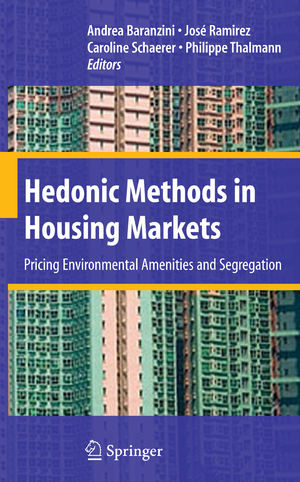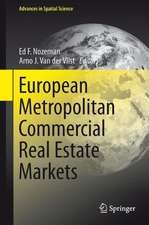Hedonic Methods in Housing Markets: Pricing Environmental Amenities and Segregation
Editat de Andrea Baranzini, José Ramirez, Caroline Schaerer, Philippe Thalmannen Limba Engleză Hardback – 27 aug 2008
| Toate formatele și edițiile | Preț | Express |
|---|---|---|
| Paperback (1) | 1217.10 lei 6-8 săpt. | |
| Springer – 28 oct 2010 | 1217.10 lei 6-8 săpt. | |
| Hardback (1) | 1220.45 lei 6-8 săpt. | |
| Springer – 27 aug 2008 | 1220.45 lei 6-8 săpt. |
Preț: 1220.45 lei
Preț vechi: 1488.34 lei
-18% Nou
Puncte Express: 1831
Preț estimativ în valută:
233.56€ • 243.53$ • 194.11£
233.56€ • 243.53$ • 194.11£
Carte tipărită la comandă
Livrare economică 20 martie-03 aprilie
Preluare comenzi: 021 569.72.76
Specificații
ISBN-13: 9780387768144
ISBN-10: 0387768149
Pagini: 278
Ilustrații: XXII, 278 p. 26 illus.
Dimensiuni: 155 x 235 x 23 mm
Greutate: 0.52 kg
Ediția:2008
Editura: Springer
Colecția Springer
Locul publicării:New York, NY, United States
ISBN-10: 0387768149
Pagini: 278
Ilustrații: XXII, 278 p. 26 illus.
Dimensiuni: 155 x 235 x 23 mm
Greutate: 0.52 kg
Ediția:2008
Editura: Springer
Colecția Springer
Locul publicării:New York, NY, United States
Public țintă
ResearchDescriere
Cities are growing worldwide and their sprawl is increasingly challenged for its pressure on open spaces and environmental quality. Economic arguments can help to decide about the trade-off between preserving environmental quality and developing housing and business surfaces, provided the benefits of environmental quality are adequately quantified. To this end, this book focuses on the use and advancement of the “hedonic approach”, an economic valuation technique that analyses and quantifies the sources of rent and property price differentials. Starting from theoretical foundations, the hedonic approach is applied to the valuation of natural land use preservation and noise abatement measures, as well as to residential segregation and discrimination, extending the analysis to the role of the buyers and sellers' identity on housing market prices and to the issue of environmental justice.
Cuprins
Methods.- Theoretical Foundations and Empirical Developments in Hedonic Modeling.- Hedonic Modeling of the Home Selling Process.- Applications to Urban Environment Issues.- Hedonic Property Value Studies of Transportation Noise: Aircraft and Road Traffic.- Pricing the Homebuyer’s Countryside View.- Semi-Parametric Tools for Spatial Hedonic Models: An Introduction to Mixed Geographically Weighted Regression and Geoadditive Models.- Estimating Hedonic Models of Consumer Demand with an Application to Urban Sprawl.- Applications to Segregation and Discrimination Issues.- Conceptual and Operational Issues in Incorporating Segregation Measurements in Hedonic Price Modeling.- Using Hedonic Models to Measure Racial Discrimination and Prejudice in the U.S. Housing Market.- The Problem with Environmental Justice Studies (And How Hedonics Can Help).- Distinguishing Racial Preferences in the Housing Market: Theory and Evidence.
Recenzii
From the reviews:
“This book provides a very useful presentation of the theory and empirics of hedonic pricing. … overall structure of the book addresses clearly the theoretical development of the hedonic price model and its empirical applications in multiple subfields. … most use to the applied urban researcher … . The authors use figures and maps to show the importance of being able to visualize one’s econometric results, especially in an area so rooted in spatial relationships as housing markets.” (Clifford A. Lipscomb, The Review of Regional Studies, Vol. 38 (1), 2008)
“This book provides a very useful presentation of the theory and empirics of hedonic pricing. … overall structure of the book addresses clearly the theoretical development of the hedonic price model and its empirical applications in multiple subfields. … most use to the applied urban researcher … . The authors use figures and maps to show the importance of being able to visualize one’s econometric results, especially in an area so rooted in spatial relationships as housing markets.” (Clifford A. Lipscomb, The Review of Regional Studies, Vol. 38 (1), 2008)
Textul de pe ultima copertă
Cities are growing worldwide and their sprawl is increasingly challenged for its pressure on open spaces and environmental quality. Economic arguments can help to decide about the trade-off between preserving environmental quality and developing housing and business surfaces, provided the benefits of environmental quality are adequately quantified. To this end, this book focuses on the use and advancement of the "hedonic approach", an economic valuation technique that analyses and quantifies the sources of rent and property price differentials. Starting from theoretical foundations, the hedonic approach is applied to the valuation of natural land use preservation and noise abatement measures, as well as to residential segregation and discrimination, extending the analysis to the role of the buyers' and sellers' identity on housing market prices and to the issue of environmental justice.
Caracteristici
State-of-the-art and recent advances in hedonic methods illustrated through empirical applications in the housing market
Integrates environmental quality, segregation and discrimination into the valuation of land use
Integrates environmental quality, segregation and discrimination into the valuation of land use







